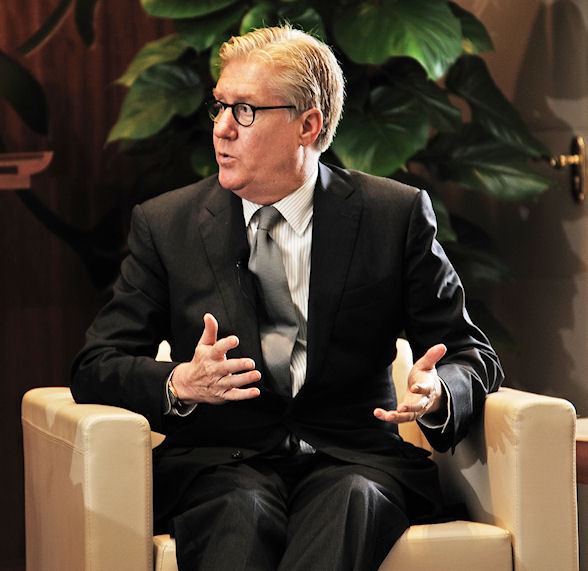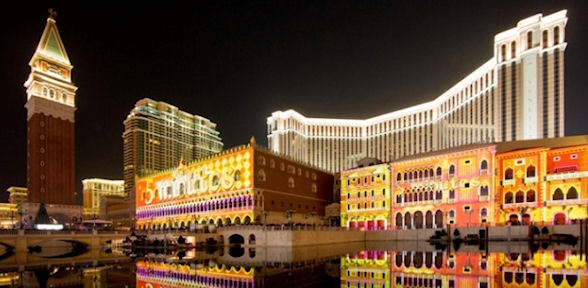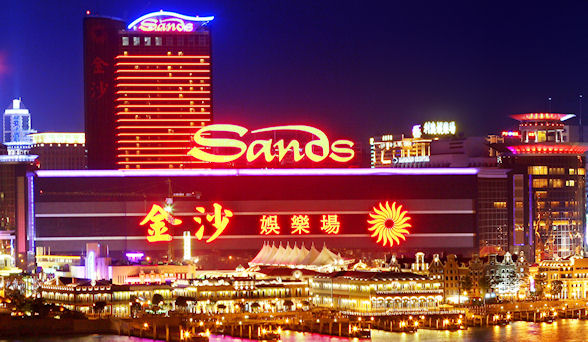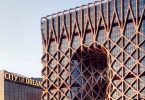This article first appeared in the Jan/Feb 2014 issue of World Gaming magazine.
Welcome to “Power People”, a series of interviews by our CEO Andrew W Scott with some of Macau and Asia’s heaviest hitters. Our Power People series will feature influential leaders not only from the gaming industry, but all areas of society.

First up in our Power People series is Mr Edward Tracy, President and Chief Executive Officer of Sands China Limited. Mr Tracy heads Asia’s largest integrated resort developer, with four properties (Venetian Macao, Sands Cotai Central, The Plaza and Sands Macao) comprising over 9,000 hotel rooms, 27,000 employees, 1,500 gaming tables and 5,700 slot machines.
Andrew W Scott: Mr Tracy, you have a long and distinguished career in the integrated resort industry dating back to a time before properties were even known as “Integrated Resorts”. You’ve spent decades in the gaming and hospitality industries in Puerto Rico, Atlantic City and New York. How did it come about that you came to Macau to run SCL?
Edward Tracy: Well I’ve known most of the guys who work at Las Vegas Sands for about 30 years. It’s where my career goes back to and they had asked me a number of times about the possibility of coming to Asia, but my son was still in high school and the timing wasn’t quite right. After he graduated I got a call and I spent some time talking to Mr Adelson about his vision here and Mike Leven about the operations. Next thing I knew I had a handshake deal and 10 days later I was on a plane to come to Macau. That was a little over three years ago.
AWS: Had you spent much time in China or Asia before taking up the position at SCL?
ET: I hadn’t worked here but I started coming to Macau in 1989. When I was CEO at Trump I paid a visit here with Mr Ho and went through the Lisboa and got my first sense of the differences between the Asian and US markets. Then I came back here pretty frequently in the late 1990s when they were talking about diversifying the ownership here in Macau. I travelled here and other destinations in Asia and Australia and so on.

Mr Edward Tracy
AWS: SCL is currently developing The Parisian Macao, the fourth SCL property on the Cotai Strip. It is due to open in late 2015 with a project cost estimated at US$2.7 billion, so it will be a substantial property. What can we expect from the Parisian Macao and how will it be different?
ET: If you look at the similarities, it will be very similar to the Venetian in that it will be highly iconic in its theming, very authentic – we’ve engaged probably the best and most well-known French interior designer, Pierre-Yves Rochon, to do the interior work for us. He does all the Four Seasons work in Europe but has also worked in China. He is responsible for the interiors at the Peninsula in Shanghai. The offering will be similar in that it will be a fully integrated resort – fully integrated and fully connected in that there will be bridges back and forth between the Venetian and the Parisian and then from the Parisian across to Sands Cotai Central and the Sheraton. The retail will be more cutting edge, more European and very specifically branded that way. The interior architecture will be as iconic if not more than the Venetian but obviously very French, so instead of a St Mark’s square it will be a Place Vendôme and quite authentic in its architectural reference. Obviously it’s not a replica and we’re not trying to do a replica but I think a really interesting piece of the puzzle will be the interactive Eiffel Tower which will not only have a big restaurant offering at different price points but also an observation tower where you can go up and take photographs. And it will be quite a spectacular view from up there as it is the highest point allowed on Cotai because of the height restrictions of the airport, so about 161 feet plus or minus – about a half the size of the original but almost identical in how it’s going to look and how it’s going to function.
AWS: Almost as good as going to the real Eiffel Tower?
ET: I don’t think it’s a substitute for the real thing but it’s a wonderful escape if you have a couple of days to get away and not a week or a big budget, you can certainly come here. And the customer acceptance of the Venetian is pretty good substantiation that these concepts work well with the Chinese market.
AWS: How is the construction going? Is it running on schedule and on cost?
ET: We appear to be on time and on budget. We have pretty good relationships here because we just finished SCC, the contractors know us so we’re pretty confident that we’re going to deliver on time and on budget. Obviously the difference between opening in 2015 and 2016 is one day if you happen to be looking at the last quarter, which we are, of 2015. If we open up on the 1st of January as opposed to the 31st of December we’ve gone into the first quarter so that’s sort of a moveable date if you will, but we’re pretty confident we’re on time at the moment.

The iconic Venetian Macao
AWS: Well speaking of SCC, let’s go back across the road for a moment. What’s the current status of SCC Phase 3? It is expected to include a fourth hotel, the luxury St Regis. The total cost to complete Phase 3 is expected to be approximately US$450 million. The same question – when can we expect to see it open and is it still looking like being on budget?
ET: It is and the time was obviously driven more by having the ability to get an approval from the government to sell shares in the Four Seasons residence because the St Regis is a very similar concept in that it’s a 5 star hotel but it also has 5 star residences. So until we had resolution of that particular issue, which we now do as of July 2013, we were not prepared to go forward. That’s been teed up now and we’re doing some new design work with it. We wanted to upgrade it a little bit, change it a little bit from the original design without changing the floors or the square footage but mostly aesthetics. There is a newer version of the St Regis which has been built not only in the US but in China in Sanya and some other markets that we really find quite appealing. The one in Singapore for example we like and the customer response to it has been quite good. We’re going through that process to finalise our approvals. That’s already part of our concession, it has already been approved. That will actually go quite quickly so it might come as a surprise to the market how fast it will go. It’s already up seven stories, the foundation has been completed so now it’s just about building out the final 37 floors or so.
AWS: I wanted to ask you about SCL’s MICE strategy. Obviously Sands has been associated with MICE all the way back to COMDEX in Vegas. The Venetian Macao and Sands Cotai Central between them now host more than 500 events per year and they bring well over one million visitors to town. These include exhibitions, trade shows, conferences, government events and incentive groups. What are your expectations for the future regarding the MICE sector in Macau?
ET: The big difference quite honestly is room inventory. We have more than abundant square footage of meeting space in total but not quite enough room inventory. In Las Vegas there is a lot of sharing. When a convention comes to town, every one of the operators will kick in 400 or 500 rooms so you can achieve the total numbers for an event. It’s difficult to do that here because most of the operators want their players in those rooms. Now we’ve got SCC up and running with a total inventory of over 9,000 rooms we have the ability to market ourselves to larger conventions and multiple conventions at the same time, so we’re starting to get some traction with that. Obviously our partners at Starwood, Hilton and Holiday Inn are very good in those markets and we’re starting to see some real interest in Macau. And there are other things that are happening that are sparking interest in Macau. One is the events that have increased the visibility of Macau as something other than a gaming destination. The other is all the infrastructure improvements from the high speed trains to the highly anticipated bridge from Hong Kong to Macau which will go right by the airport and give us a chance to deliver customers much quicker and easier. I think that’s going to be very appealing to the MICE business. We’re very optimistic about the future, we’re very pleased with our progress to date and we think 2014 is going to be a record year.

AWS: You’ve worked for a number of “larger than life” personalities in Sheldon Adelson and Donald Trump. How would you compare Mr Adelson and Mr Trump?
ET: Well, I probably wouldn’t. They are very different people and I’m very different today too than when I was a young 40 year-old fronting the biggest gaming company in the world for Mr Trump. I think the difference is that Sheldon to me is a real innovator in terms of product offering. People argue about who invented integrated resorts and who didn’t but certainly he executed on it so in terms of being a pioneer in Asia, he has changed the face of not just Macau, but Asia in terms of the expectation of what the resort business can be. I think that’s a big difference. Donald was a very product driven guy but sort of insulated in that New York, real estate purview if you will – lots of skyscrapers all done elegantly but in the same fashion. Whereas Sheldon not only builds the Venetian in Las Vegas and pioneers it in Macau, then he builds Marina Bay Sands – and who would have guessed that architecture and that product could have come out of the same people responsible for something as traditional and more classic from an architectural standpoint as the Venetian? So they are very different guys, very different visions with very different execution but both wonderful experiences. They are interesting bookends – one at the beginning and one sort of at the end of my career.
AWS: There is much talk within the industry about the differences between the regulatory environments in Macau and Singapore. Several Asian countries are currently going through the process of considering liberalising gaming laws and many are looking to Singapore as a possible model for their regulatory framework. What’s your view on the differences in regulation between the two jurisdictions and what would you consider to be the main advantages and disadvantages of each?
ET: I don’t know that I’m an expert on Singapore to be honest with you. My experiences were in the United States and Puerto Rico. I’d be hard pressed to draw a comparison as to which one is more efficient, which is better, which is stricter because they come from very different perspectives. Singapore is obviously much, much newer. The government had some very specific objectives that they wanted to fulfil whereas Macau has been in this business for more than 40 years and has evolved over a period of time. Macau has gone through a number of changes – some of them cultural, some of them the modernization of the industry and keeping up with technology and so on. I’m not sure I’m the right guy to talk about the specificity of Singapore other than they seem to be doing a great job over there and the projects are very successful.

The Sands Macao – where it all began
AWS: SCL hosts more than one international entertainment event per week, and these events attract hundreds of thousands of visitors. In fact the average crowd for these events is over 5,000 people. Will these events continue to grow and attract more visitors to Macau?
ET: We’re going to see new records for sure. When we look at the market, we try to understand, “What is the product offering that we need to give our customer for each market segment?” So you will see us doing a lot of different types of entertainment at different price points with different cultural focuses. We do a lot of very traditional cultural events that are China driven, we do a lot of pop culture, so K-pop and Cantopop and J-pop. We also do some Western acts. Rihanna was a very big success for us. She sold out 25,000 tickets in two days for two shows. It was an unbelievable response from our customer base. We had the Nitro Circus this year, which was really out of the mainstream but it was an amazing event and the customers responded so favourably that we’re considering bringing it back. When we look at the opportunities we have, there are a lot of things we have to take into consideration. One is, what does the market tell us that they want and how do we go and acquire that? If we’re talking about a Rihanna, if she’s not out on tour it’s very difficult to go out and acquire a top performer like her. Avril Lavigne is another example. Her name keeps coming up in our focus groups. She was just here for an awards show and did a performance for us. With the more Asian-centric things it’s a little bit easier for us to get access to people like Eason Chan and Francis Yip and some of the classic performers out of Hong Kong. But we’ve also got another venue and that’s the Venetian Theatre. Because there is not a resident show there anymore, the Venetian Theatre gives us the flexibility to do one off shows and try to capture people as they are coming through Asia, so we were able to bring the Beach Boys in which was kind of a unique nostalgic act, we were able to bring George Benson in who is one of the great jazz performers from the US. We also did the Nutcracker on Ice with the national ballet from China – the Chinese version – as well as the China Symphony Orchestra, the China 3 Tenors, the Philadelphia Orchestra on its 40th anniversary through China. It was part of the Kissinger-Nixon cultural exchange back in ’73 I believe. So we have that flexibility and elasticity to do giant events but also very intimate events. In the fight game, we’re obviously very dedicated to different forms of fighting and getting into the fight game all the way. That means traditional boxing, mixed martial arts with UFC and then Muay Thai which we’re still working on. The kinds of events we’ve been able to bring in have been very successful already. It gave us the opportunity to coalesce the thought process around bringing a really big global event which was the Pacquiao event – which was a whole other level of expectation and execution for us. It’s also a whole other level of expense and planning and press and so on, so we had to change our strategy a little bit in terms of how we priced the event, for example. Obviously the pay per view back in the States helps us dramatically. We don’t have the ability to do that in China, to monetize that viewing, but the fact that we can get into 200 million homes on a CCTV broadcast to me is quite valuable. It’s good for our brand, it’s good for Macau, it raises a level of awareness that these massive events that are popular all around the world are happening here in southern China. So it’s got a lot of advantages. It’s got a lot of risk associated with it but it’s balanced with a fairly calculated business approach as to how we’re going to be able to at least try to break even on an event like that.
AWS: When in Macau, do you stay on site? From a management productivity point of view, do you think it is a good idea for a CEO to live on site or do you feel it’s better to get away from time to time?
ET: I think different people have different views on it because they are at different places in their life but I live on the property by choice. My involvement is not only in the business but the business affairs of SCL. As you mentioned it’s a very big company, I have a lot of public company duties, I have a lot of government relations duties, I have commitments to the community and all of that takes a lot of time. If you’re ever going to have a relationship with your wife it’s easier to take the elevator home than having to go someplace else. But it also gives me the ability to be very visible around the property – interact with the employees, interact with customers. I find that this level of interaction for this sized company is invaluable. When I operated Trump’s company, which was also a very, very big company – at the time it was the largest company in gaming – I lived part of the time on property and part off. I was in New York City part of the time and Atlantic City part of the time. So I’ve done this before. When I was in Puerto Rico I lived on property so it’s a common theme in how I operate and I attribute part of my success to the fact that I am available and I am accessible not only to the employees but to the customers. It works for me, it doesn’t work for everybody. I get that. I guess that’s the best way for me to answer that.

AWS: How much time do you spend in Macau each year? Are you constantly flying back and forth between Macau and Las Vegas?
ET: I spend 95 percent of my time here in Macau. If I were to pick a getaway I’d pick somewhere like southern Thailand rather than going back to the States. I go back to the States for business obviously. I attend board meetings and company functions but for the most part I’m here. I’m a full time resident here.
AWS: I have one last question that has nothing to do with gaming whatsoever. When you have some free time, do you have any particular hobbies or passions?
ET: I like to travel. My wife and I both like to travel through Asia – especially China because we have better access to China now. I’m a sports enthusiast – I’m a tennis player and I try to stay in shape. I work out. I’m an avid reader – I get a lot of satisfaction out of reading both history and biography but also fiction. Those are the things that take up most of my time. My wife and I are involved in charitable organizations here in town and then we have a family to take care of back home so my wife and I are quite busy here in the community.
AWS: Ed, it’s been a real pleasure to speak to you, thank you very much for taking time out of your busy schedule to speak with us.
ET: Happy to do it!







